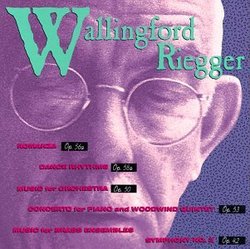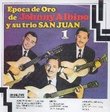| All Artists: Wallingford Riegger, Alfredo Antonini, Howard Hanson, John Barnett, Eastman-Rochester Symphony Orchestra, Harriet Wingreen, New Art Wind Quintet, The American Brass Quintet Title: Riegger: Symphony No3, Romanza, Dance Rhythms, Music for Orchestra, Concerto for Piano and Woodwind Quintet, Music for Brass Choir, Movement for Two Trumpets Trombone and Piano, Nonet for Brass Members Wishing: 0 Total Copies: 0 Label: Composers Recordings Release Date: 6/10/1994 Genres: Dance & Electronic, Classical Styles: Ballets & Dances, Dances, Chamber Music, Forms & Genres, Concertos, Historical Periods, Modern, 20th, & 21st Century, Instruments, Brass, Keyboard, Symphonies Number of Discs: 1 SwapaCD Credits: 1 UPC: 090438057226 |
Search - Wallingford Riegger, Alfredo Antonini, Howard Hanson :: Riegger: Symphony No3, Romanza, Dance Rhythms, Music for Orchestra, Concerto for Piano and Woodwind Quintet, Music for Brass Choir, Movement for Two Trumpets Trombone and Piano, Nonet for Brass
CD DetailsSimilar CDs
|
CD ReviewsFinally, all this fine material gathered together 07/06/2000 (5 out of 5 stars) "Wallingford Riegger's work is so fine, it used to be incredibly maddening to have to find a little work here, a little there, pieced in there, shoved in here. Now, all these fine performances are gathered together and simply put on one disk where we can get the measure of the man.And what a man, and what art! The old Columbia Symphony No. 3 is wonderful to have back, remastered and joyous. Hanson, of course, makes the most of it, and the '53 sound is so good you don't realize its clarity and naturalness is mono.Antonini and the Santa Cecilia Orchestra present their contributions equally well, in excellent sound, gathered from old CRIs and what not, as is the Oslo material. The Oslo group wouldn't be considered a liability only if you hadn't heard the standards of Rome and Rochester first, but you have to forgive it because what it handles is so good.Over time, critics have praised all these works to the skies, so there's no need for me to do it again. My contribution is to just urge you to get this and enjoy a lot of superb music by a supremely talented (and oftentimes funny and quirky) American composer...all on one, fine, fine disk!" An undervalued but major American modernist Discophage | France | 05/21/2007 (5 out of 5 stars) "The music of Wallingford Riegger (1885-1961) is difficult to pigeonhole. On the basis of his Barberesque "Romanza" Op. 56a from 1953 and Coplandesque "Dance Rhythms" Op. 58a from 1955, one might mistake him for one of those trite and derivative composers of sub-Copland (or even sub-Thomson) "Americana". Both are "Gebrauchsmusik" (music written for a specific purpose) that have no reason to outlive their occasion (the first was written for a school orchestra and was meant to be not too difficult, the second for a dance company), quickly heard, quickly forgotten.
But then comes the contemporary (1953) "Music for Orchestra" Op. 50, and one is reminded that in the 1920s Riegger was a member of the so-called "American Five", along with Ives, Cowell, Ruggles and the all-but forgotten figure, John Becker, and later an introductor of the Schoenbergian twelve-tone system in the United States. "Music for Orchestra" is quasi-serialist yet colorful and whimsical but also dramatic piece, as advanced as anything Sessions wrote in those years. The Third Symphony Op. 42 from 1948 is equally advanced for its days in its musical language, dodecaphonic, fugal, and again highly dramatic, of near-Bergian intensity in some places (Schoenberg's 5 Pieces Op. 16 also come to mind, but there is more of the "American Epic" and more robust rhythms in Riegger's composition). I wouldn't hesitate to call it one of the greatest American symphonies written in the 1940s, and I don't know many that approach its power and anger (Barber's Second Symphony, maybe?) - but I am not surprised that it didn't really establish the standing of Riegger, so advanced and non-immediately seductive is its language. According to the liner notes, Riegger himself classified his own music in four categories: "non-dissonant (mostly)", "impressionist", "partly dissonant" and "dissonant". The Concerto for Piano and Woodwind Quintet Op. 53 (from 1953 as the "Music for Orchestra") is neo-classical in its language but rather dramatic in atmosphere, somewhere between Janacek's Capriccio for Piano and Winds and Bartok's Piano concertos. The same is true of the earlier Nonet for Brass Op. 49 (1951), rather neo-classical in language and mischievously biting in atmosphere. Riegger is a master at eliciting a great range of colors despite the use of an instrumental group of similar timbre. The composer shows again his appetite for unusual instrumental combinations and sonorities in the short (4:15) "Movement for Two Trumpets, Trombone and Piano" written in 1960 and one of his last compositions, contrapuntally elaborate but full of dance-like, jazzy bounce. The Music for Brass Choir Op. 49 is an extraordinary work, so forward looking in its use of clusters for the sake of sheer sound color and atmosphere (rather than melody or harmony) as to evoke Ligeti's Atmospheres. And it was composed in 1949! The mood is ominous and dramatic. It should be a staple of the brass band repertoire. CRI has gathered together recordings of various origins, whose dates range from 1952 mono (the recording dates aren't given on the CD, but the Symphony was the recipient of the 1951 Walter Naumburg Recording Award - a year after Schuman's 3rd by Ormany and a year before Mennin's Third by Mitropolous -, then recorded in April 1952 and originally released as Columbia ML 4902, paired with Mennin's composition) to stereo 1967 (the works for brass and winds). The sound is nowhere terrific but everywhere acceptable, sounding the more distant in the 1956 recordings of Romanza, Dance Rhythms and Music for Orchestra (originally on LP CRI-117 with works by Avshalomov and Cazden). The original CD was published in 1990, and the liner notes expressed the hope that the reissue would help spawn a revival of interest in the music of Riegger. I don't think it has, lamentably, but this disc makes me want to explore more. Since the deplorable demise of CRI, New World Records has acquired the label's invaluable catalog, and I have the CD as a recent New World reissue. I've experienced difficulties playing it on my portable Sony MP3 CD player (it stops, even when I barely move). It seems to play fine on my normal player, so I thought at first that my Sony was breaking down. But CDs from other labels play alright, and I've experienced similar problems with other NW-reissued CRI CDs ("The Unknown Ives" by Donald Berman), so I am suspecting that New World copying process might be the problem. " |


 Track Listings (13) - Disc #1
Track Listings (13) - Disc #1